BANGKOK, July 26 – In a heartfelt plea echoing the desperation of families caught in the crossfire, Cambodia has called for an “immediate and unconditional ceasefire” with neighboring Thailand after a second day of deadly border clashes that have claimed lives, displaced thousands, and heightened fears of a broader conflict.
Speaking with urgency at the United Nations following a closed-door Security Council meeting, Chhea Keo, Cambodia’s representative, said, “We are not asking—we are urging for peace. We want a ceasefire, now. People are suffering.”
Tensions between the two Southeast Asian nations flared dramatically on Thursday, reigniting a decades-old border dispute. What began as a long-simmering disagreement exploded into full-scale combat involving fighter jets, tanks, artillery, and ground troops. The UN Security Council convened an emergency session on Friday to address the growing crisis.
On the ground, the reality is grim. In Cambodia’s Oddar Meanchey province, a 70-year-old civilian was confirmed dead, with five others wounded by artillery fire. On the Thai side, over 138,000 people have been evacuated from the border region, with 15 fatalities reported—14 civilians and one soldier. Forty-six more people, including 15 soldiers, were wounded, according to Thailand’s health ministry.
Fighting resumed early Friday morning in three separate areas, according to the Thai military. Cambodia reportedly launched BM-21 rocket systems and heavy field artillery, while Thai troops retaliated. But by afternoon, the gunfire had quieted somewhat.
Hope for Peace?
There is a glimmer of hope: Thailand’s Foreign Ministry signaled willingness for diplomatic negotiations. Spokesman Nikorndej Balankura told AFP, “We are ready to talk—bilaterally, or even with the support of Malaysia. But we’ve received no response so far.”
Malaysia, currently chairing the ASEAN regional bloc, could serve as a mediator between the two member states.
Still, acting Thai Prime Minister Phumtham Wechayachai warned that if diplomacy fails, the region may slide deeper into violence. “If this continues, it could turn into war,” he said, though he stressed that current hostilities remain limited to localized clashes.
Children Caught in Chaos
While diplomats talk, civilians run. In Samraong, just 20 km from the frontlines, families are fleeing by the dozens. Mothers cling to toddlers, fathers drive packed vehicles toward safety. Pro Bak, a 41-year-old father of two, shared through tears, “We live so close to the border. We’re scared. I’m taking my family to the Buddhist temple. Maybe we’ll be safe there.”
The violence stems from a long-standing territorial dispute along the 800-kilometer (500-mile) border, a conflict that previously led to clashes from 2008 to 2011, killing dozens and displacing tens of thousands. A UN court ruling in 2013 brought temporary calm, but recent tensions reignited in May when a Cambodian soldier was killed.
As both sides continue to blame each other, the international community watches with concern. The UN Security Council urged both countries to show maximum restraint and resolve the dispute diplomatically.
But for the families sleeping in temples and shelters tonight, diplomacy cannot come fast enough.




